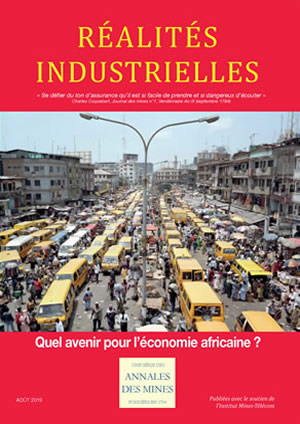|
 Août 2019 - Quel avenir pour l’économie africaine ? Août 2019 - Quel avenir pour l’économie africaine ?
Water Integrity to close financing gaps in Africa
By Teun BASTEMEIJER
Currently senior advisor with the Water Integrity Network and steering committee member of the OECD Water Governance Initiative
In 2015, the combination of the adoption of the SDGs and the Paris agreement on climate change gave a positive impulse to building transformative capacities around the globe. Only few years later, the World Economic Forum’s Global Risks Report 2019 wonders if the world is sleepwalking into a crisis. In Africa competition to gain control of land, water and mineral resources is increasingly fierce and rent-seeking by political figures, global corporations, endowment funds continues under conditions of impunity.
In Africa, a reputation of high risks and poor sector performance across the board is associated with poor governance and lack of strong and accountable institutions causes a considerable investment gap. Closing that gap could be fast as soon as there are sufficient positive indications of improving sector performance.
OECD principles for water governance and the Water Integrity Global Outlook with various concepts, lessons learned and integrity tools form a good initial basis to design strategies and projects to improve sector performance and gain trust. Evidence of emerging good governance and integrity practices to can help build trust and engagement among different stakeholders and make the African water sector more attractive for investors and help to close the investment gap.
 Télécharger gratuitement l'article Télécharger gratuitement l'article
 Retour au sommaire Retour au sommaire
 August 2019 - What future for the African economy? August 2019 - What future for the African economy?
Water Integrity to close financing gaps in Africa
Teun Bastemeijer,
Currently senior advisor with the Water Integrity Network and steering committee member of the OECD Water Governance Initiative
In 2015, the combination of the adoption of the SDGs and the Paris agreement on climate change gave a positive impulse to building transformative capacities around the globe. Only few years later, the World Economic Forum’s Global Risks Report 2019 wonders if the world is sleepwalking into a crisis. In Africa competition to gain control of land, water and mineral resources is increasingly fierce and rent-seeking by political figures, global corporations, endowment funds continues under conditions of impunity.
In Africa, a reputation of high risks and poor sector performance across the board is associated with poor governance and lack of strong and accountable institutions causes a considerable investment gap. Closing that gap could be fast as soon as there are sufficient positive indications of improving sector performance.
OECD principles for water governance and the Water Integrity Global Outlook with various concepts, lessons learned and integrity tools form a good initial basis to design strategies and projects to improve sector performance and gain trust. Evidence of emerging good governance and integrity practices to can help build trust and engagement among different stakeholders and make the African water sector more attractive for investors and help to close the investment gap.
 Retour au sommaire Retour au sommaire
|




